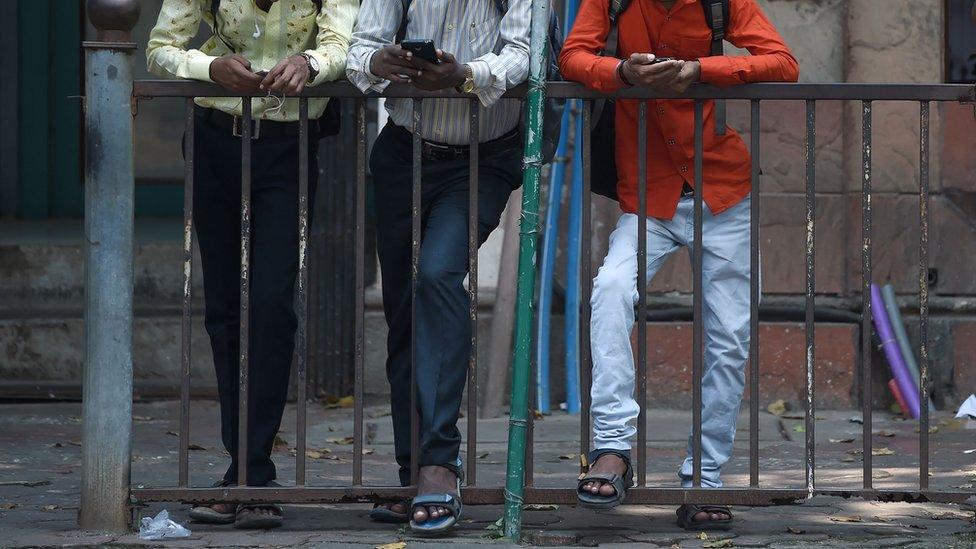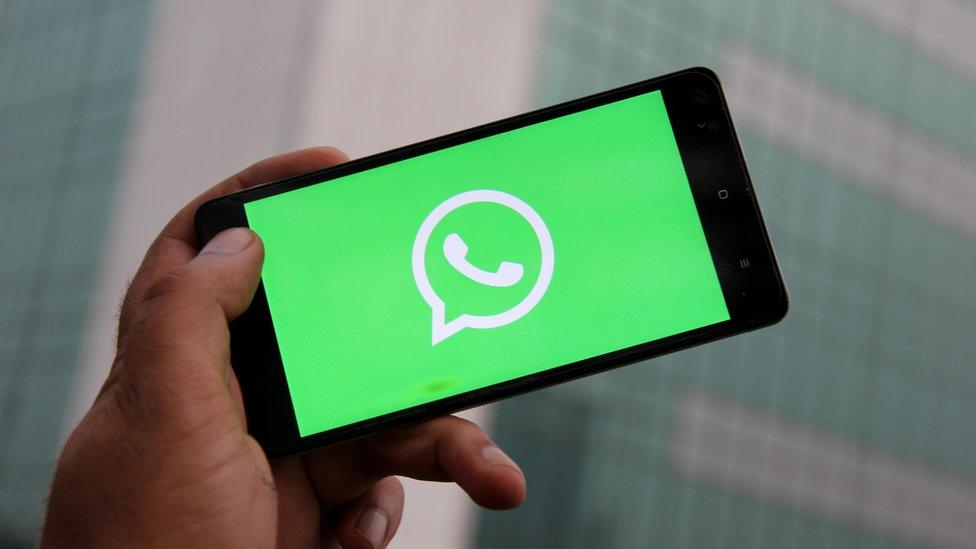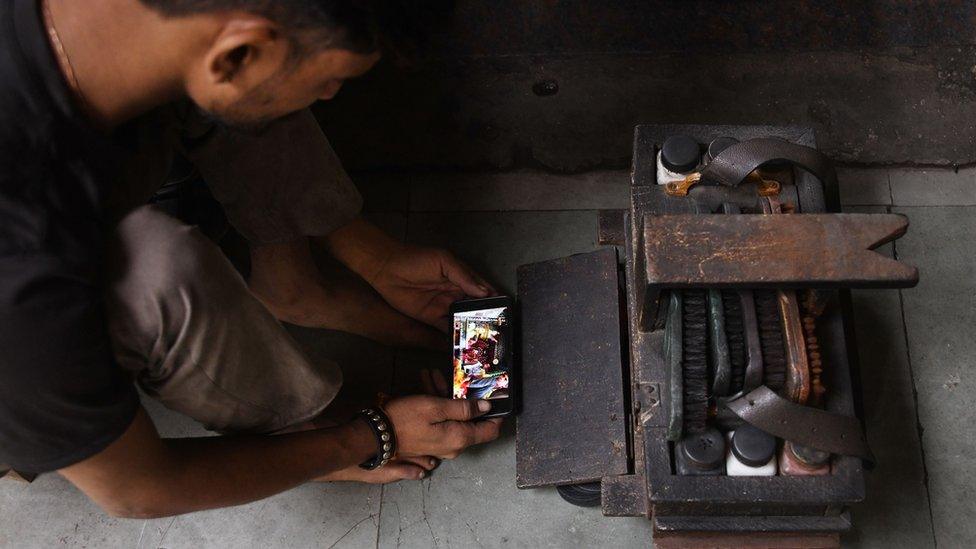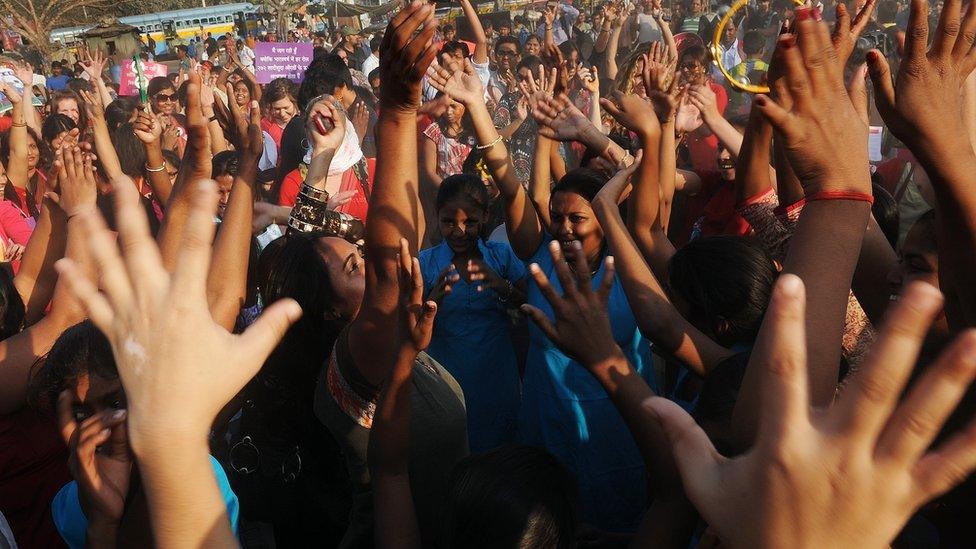Why smartphones are skewing young Indians’ ideas of sex
- Published

Making pornographic material or sharing it is illegal in India
A troubling trend of rape videos going viral in India has led many to believe that smartphones and easy access to violent porn, coupled with a lack of sex education, could fuel sexual violence. The BBC's Divya Arya reports.
Earlier this year, a video showing a group of teenage boys trying to rip the clothes off a young woman was shared extensively on WhatsApp in India.
In it, she is urging them to stop, using the term "bhaiyya" (Hindi for brother) but they are jeering, laughing, clearly enjoying themselves.
As the video went viral, police were able to establish that it was filmed in a village in the northern state of Bihar. The accused teenagers were arrested.
The arrests caused anxiety in their village in Jehanabad, a four-hour drive from the state capital Patna, where village elders blamed the entire incident on smartphones.
Making pornographic material or sharing it is illegal in India.
But even as it becomes easier to access pornography thanks to cheap data and smartphones, there is concern that this isn't being accompanied by any meaningful understanding of sex and relationships.
Local boys in the village freely admitted to the BBC that they watched videos of molestation and rape. One 16-year-old said he had seen more than 25 such videos, adding that his friends often shared them on their smartphones.
"Most boys in my class watch these videos together or sometimes by themselves," another boy said. "It feels fine because everyone does it."
Experts say this kind of introduction to sex is typical for many Indian men.

WhatsApp is the medium often used to share such videos
"We have not grown up being given sex education or having normal adult conversations about these things," says filmmaker and writer Paromita Vohra. She runs the website Agents of Ishq (Romance), which encourages open discussions about sex.
"When people only watch violent sexual content, it is very desensitising because they start believing that violence is the only way to get pleasure and that female consent is unimportant."
India has 400 million smartphone users, and more than half of them use WhatsApp, which is the medium often used to share such videos.
In a statement to the BBC, WhatsApp said: "These horrendous rape videos and child pornography have no place on our platform. That's why we've made it easy to report problems like these so we can take appropriate action, including banning accounts. We also respond to valid legal requests from law enforcement in India to help them investigate crimes."
Porn ban
Concerned after a case in which some young men gang-raped a schoolgirl after allegedly watching porn on their mobile phones, a court in the northern state of Uttarakhand asked the federal government to reinstate a 2015 ban imposed by the Supreme Court on websites hosting violent pornography.
It had been revoked almost instantly due to widespread protest.
The ban only applies to some 800 websites that contain violent or abusive videos. This does not seem to have had much impact though.
Within days of being blocked, one of the largest pornography websites had already set up a mirror site with a different URL for its Indian market.
But is banning porn the answer?
Many believe it is the lack of sex education that is fuelling the appetite for violent and misogynistic videos. Often, there is no deeper understanding of what a sexual relationship or experience should be for both men and women.
This is something the government tried to change in 2009, when it began its Adolescent Education Programme (AEP). It sought to address changes in adolescence and dispel myths about gender, sexuality, sexually transmitted diseases and drug abuse.
But implementing the programme remains a challenge. At an all-girls school in Jehanabad for instance, the principal had never heard of it.

Many say it is the lack of sex education that is behind the proliferation of violent videos
Huge market
Sunita Krishnan, the founder of Prajwala, an organisation in the southern city of Hyderabad that deals with issues of sexual violence and trafficking says these violent videos reinforce the old belief that a woman's choice is insignificant and she has no agency.
Ms Krishnan, a rape survivor herself, has also received such videos and has been campaigning to check their spread. In fact, the 2015 Supreme Court ban on porn sites was a result of her efforts.
Even though she has managed to get a few of these videos taken down, she says it can be near impossible to completely erase something from the internet.
Ranjeet Ranjan, who is one of only three women amongst Bihar's 40 MPs, says the lack of concern about such videos is alarming.
"No-one really cares. If people had even a little respect for these girls, they would have gone to the police station instead of sharing such videos," she said.
Ms Ranjan is also concerned by what she sees as "a competition" to make such videos.
"If these continue to circulate and we have no sex education, then it will embolden the thinking that a woman should be treated as an object, a source of entertainment."
- Published16 December 2017

- Published4 April 2018
